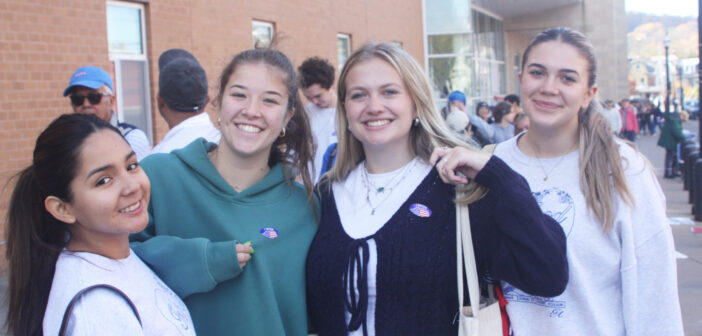In this election, 41 million members of Generation Z are eligible to vote — 8 million of which are eligible to vote for the first time.
Brian Fife, the chair of Lehigh’s political science department, said the 2024 presidential election is being marketed as the “most important vote” that voters will ever make. Not only does the 2024 election differ in both mainstream candidates’ different political ideologies, but their marketing strategies as well.
He said this election is unlike any other presidential election he’s witnessed.
Former President Donald Trump will be running for candidacy for the third time in a row, whereas Vice President Kamala Harris began her campaign in July, after current President Joe Biden stepped out of the race.
Carolyn DeWitt, the president and executive director of Rock the Vote, also said this generation of voters will have a substantial impact in the 2024 presidential election.
Rock the Vote is a nonpartisan nonprofit dedicated to empowering young people through voter registration, education mobilization, protecting young people’s right to vote and addressing barriers to youth participation and voter turnout. DeWitt said the organization has been around for over 30 years, and the reason the organization was formed is because young voters — specifically those under the age of 30 — vote at lower rates than older voters.
Dewitt said younger voters turn out 20% to 30% less than older voters. While some might look at this as a generational problem, she said she believes it’s a systemic problem.
“The research over and over says that the main reason for that is that they are new voters,” DeWitt said. “They’re just going through the process for the first time, and frankly, it’s becoming more and more comparatively archaic to young people’s day-to-day lives.”
A national poll released by the Institute of Politics at Harvard Kennedy School found 53% of young Americans — 18-to-29-year-olds — indicate they will “definitely be voting” in the 2024 general election.
DeWitt said Rock the Vote does a lot of work in the tech space to try to make voting resources more accessible to this age group, as they hold the power to decide what direction communities and the country go in.
“There are a lot of issues at stake that people care about, and the (Gen Z) is incredibly passionate about these issues,” DeWitt said.
DeWitt said Walz mentioned at the Democratic Convention that this election is going to be decided by young people.
She said she thinks the Harris-Walz campaign has recognized this reality and tried to uplift and speak to young people.
“I think the reality is no campaign can really win without young people,” DeWitt said. “There’s no path to victory for either campaign without young people.”
When Harris became the nominee, DeWitt said she saw the Harris-Waltz campaign lean into Gen Z culture by leveraging social media with content like memes.
“Even from the way that they write their press releases, with a little bit of snark, really focusing on the issues that we are seeing resonate with young people — things like reproductive rights, climate change, gun violence — and really addressing them,” DeWitt said.
She said she hasn’t seen those tactics in the Trump-Vance campaign as much and they haven’t spoken about important issues to young people or offered them solutions to those issues.
Fife said neither candidate’s campaign is error-free in terms of efficacy, but Harris’ campaign is more “disciplined” compared to Trump’s.
“I think you can’t use the word disciplined and use the Trump campaign in the same sentence because his own advisors would like him to be more disciplined,” Fife said. “This shows up in his rallies, and I think they find this endearing – that he’s not wedded to the teleprompter and goes off the cuff often– but I don’t think that helps him with Independents and people who haven’t committed to either side.”
Fife also said former President Richard Nixon was the standard bearer when it came to having a campaign based on fear, but now Trump may have superseded him in fear-mongering.
DeWitt said it’s hard to predict what’s going to have the biggest influence on future elections because the world is changing so much. However, she said she thinks social media will continue to play a major role, especially with young people.
In an email to The Brown and White, marketing professor Laura Smarandescu wrote that social media and AI play a big role in elections.
She also wrote that celebrities are playing an interesting role in voter motivation. For example, Taylor Swift’s connection and influence over female fans — particularly first-time voters — is significant, especially since she is a Pennsylvania native.
She referenced Lin-Manuel Miranda, and how his success with Hamilton has made him a powerful voice for diversity and civic engagement, and how he has been active on social media and created connections with Latino communities.
“Swift and Miranda highlight how cultural leaders who resonate with specific demographics can sway turnout, especially in crucial swing states like Pennsylvania where every vote counts,” Smarandescu wrote.
She also wrote that virality — being rapidly spread or popularized using people communicating with each other, especially through the internet — is impactful in politics, and anything that goes viral close to elections has the potential to impact voting behavior.
She wrote that young people spend a lot of time on social media, and it’s often where they get their news.
“There is potential for exposure to false information and AI-generated content,” she wrote.
However, Fife believes celebrity endorsements and campaigns can only go so far.
In a rally in Houston, Texas, Beyonce introduced Vice President Kamala Harris. The star said, “I’m not here as a celebrity. I’m not here as a politician. I’m here as a mother.”
DeWitt said political content on social media can be overwhelming, and she sees the impact of misinformation.
Smarandescu wrote that polls are often misinterpreted and can mislead the public.
“This can lead to overconfidence (as was the case with Hillary Clinton, where some people may have assumed she’d win and decided not to vote) or unnecessary anxiety,” she wrote.
From a marketing perspective, Smarandescu wrote that an insightful metric to consider is Google search data in key battleground states, and analyzing these searches can predict voter turnout and county-level voting behavior better than survey responses.
Trump’s support might be underreported, she wrote, as some voters may avoid revealing their preference in polls yet still turn out to vote.
DeWitt said when Biden dropped out and Harris became the Democratic nominee, she witnessed an energy shift in terms of registration numbers.
In Pennsylvania, in the week after Biden dropped out of the race, the state saw an increase of 5,227 registered Democrats, according to research from Spotlight PA.
“Democrats have seen a net increase in their total registered voters each week,” according to Spotlight PA. “However, Republicans and unaffiliated or third-party voters are adding new registrations at an even faster rate.”
DeWitt said the focus in swing states is something she sees from candidates in every presidential election.
She said one common campaign tactic in these states is targeting large college campuses.
“You are seeing campaigning happening in places you might not normally see, in order to appeal to young demographics (such as) students,” DeWitt said.
DeWitt said nationally she continues to see a lot of energy from young people in response to the Harris-Walz campaign, a big part of which she attributes to the campaign’s tactic of hiring young people to do outreach and work.
Fife said that middle-aged and older Americans are much more likely to vote than younger people.
“I think that’s unfortunate because younger people have much more political clout than they perceive,” Fife said, “I cannot help but think that the status quo would be different if younger people came out in droves when it comes to election day.”
DeWitt said ultimately, the voting results will tell which marketing strategy was the most effective more than any prediction.






Comment policy
Comments posted to The Brown and White website are reviewed by a moderator before being approved. Incendiary speech or harassing language, including comments targeted at individuals, may be deemed unacceptable and not published. Spam and other soliciting will also be declined.
The Brown and White also reserves the right to not publish entirely anonymous comments.
1 Comment
Hard to believe this country would actually elect an avowed Marxist ticket. Nikita Kruschev predicted that they would destroy American Capitalism from within without ever having to fire a shot.
Communism doesn’t work without tyranny such as Putin’s assault on Ukraine. If Harris/Walz win today it will validate the indoctrination campaign in schools that began 50 years ago.